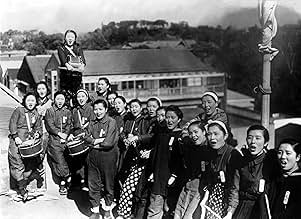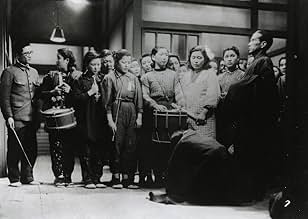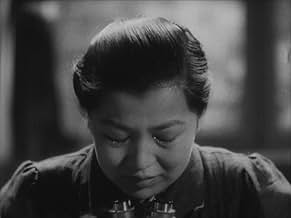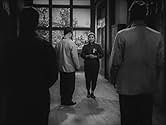AVALIAÇÃO DA IMDb
5,6/10
2,6 mil
SUA AVALIAÇÃO
Adicionar um enredo no seu idiomaWorld War II film about female volunteer workers at an optics plant who do their best to meet production targets.World War II film about female volunteer workers at an optics plant who do their best to meet production targets.World War II film about female volunteer workers at an optics plant who do their best to meet production targets.
Avaliações em destaque
This is a great movie - a must-see. I saw it without subtitles, and my Japanese wasn't good enough to catch most of the dialog, but the raw emotional power of the cast and of the imagery made it easy to follow - completely engrossing, in fact. The story is about a group of women factory workers in WWII Japan, and how each one must overcome whatever personal hardship they face to help the group succeed. The sense of being swept up in a titanic struggle, and the almost superhuman selflessness and group cohesion that that breeds, are the same themes treated in "Twelve-O'clock High". The two movies would make an enlightening double feature. One image sticks with me: although it's not focused on, throughout the movie you see the women carefully taking off their shoes and placing them neatly by the door as they come in to the dormitory, and you see them carefully put them on as they leave. During one scene, when a girl is returning from the hospital, everyone rushes to greet her. Kurosawa cuts to a shot of the shoes, as they are thoughtlessly trampled by the women eager to meet their friend.
Most Beautiful, The (1944)
** (out of 4)
Interesting WW2 era film about a factory in Japan who asks their men to raise production by 100% and then ask the women to do 50%. At first the women are insulted by not being asked to do as much as the men but they soon find out that this raise in production is going to test every bit of their soul both physically and mentally. This early Kurosawa film isn't a good one but it is interesting and does have a few moments where the director does something great. What I found most interesting about the film is how different it is from the WW2 films that were being produced in Hollywood at the time. There's no question that this is a propaganda piece for the Japanese people but it's interesting to see how their moral was attempted at being raised. Most of the American WW2 pictures were "fight, fight, fight" and you can say that about this film but the difference is that the fight is mostly a personal drama with each of the women. Then being ashamed that they can't produce more for their country. Being ashamed that they are sick and can't do their part for a day. Ashamed that their parents might learn they were sick and couldn't do the job. The film does a pretty good job at building up these dramas but sadly none of their stories are strong enough to make the film be a total success. I think most of the blame has to go towards the screenplay that is a bit too over dramatic during certain scenes and there are some major issues with some of the performances. It's obvious Toho didn't give Kurosawa much of a budget but the director shows that he can handle the personal drama quite nicely. The most impressive sequence in the film happens early on when the women are told that production is going to be raised. This somewhat long sequence shows us many of the women talking amongst each other and Kurosawa builds up us thinking they're unhappy about the raise but the way he explains what they're really upset about was quite powerful. The film runs 85-minutes and even at this short pace the film begins to run out of gas and really drag along towards the end. Fans of Kurosawa will probably want to check this out but others will probably hit the stop button early on.
** (out of 4)
Interesting WW2 era film about a factory in Japan who asks their men to raise production by 100% and then ask the women to do 50%. At first the women are insulted by not being asked to do as much as the men but they soon find out that this raise in production is going to test every bit of their soul both physically and mentally. This early Kurosawa film isn't a good one but it is interesting and does have a few moments where the director does something great. What I found most interesting about the film is how different it is from the WW2 films that were being produced in Hollywood at the time. There's no question that this is a propaganda piece for the Japanese people but it's interesting to see how their moral was attempted at being raised. Most of the American WW2 pictures were "fight, fight, fight" and you can say that about this film but the difference is that the fight is mostly a personal drama with each of the women. Then being ashamed that they can't produce more for their country. Being ashamed that they are sick and can't do their part for a day. Ashamed that their parents might learn they were sick and couldn't do the job. The film does a pretty good job at building up these dramas but sadly none of their stories are strong enough to make the film be a total success. I think most of the blame has to go towards the screenplay that is a bit too over dramatic during certain scenes and there are some major issues with some of the performances. It's obvious Toho didn't give Kurosawa much of a budget but the director shows that he can handle the personal drama quite nicely. The most impressive sequence in the film happens early on when the women are told that production is going to be raised. This somewhat long sequence shows us many of the women talking amongst each other and Kurosawa builds up us thinking they're unhappy about the raise but the way he explains what they're really upset about was quite powerful. The film runs 85-minutes and even at this short pace the film begins to run out of gas and really drag along towards the end. Fans of Kurosawa will probably want to check this out but others will probably hit the stop button early on.
Typical of Japanese war-time propaganda, the film suggests that Japan's fascist ideology, its inculcation of fanatical obedience, its vast perpetration of unthinkable atrocities in a systematic manner, and its aggressive military expansionism can all be replaced by Japan's supposed victimization. Rather telling in this respect is the song that the girls repeatedly sing to boost morale, a song that recalls that barbarian Mongol conquerors once tried to invade Japan from China, but that the perpetrators of such heinous deeds of aggression could not possibly co-exist under the same sky with the innocent and pure Japanese-- this, of course, is being sung during a war that was begun when an utterly unprovoked Japan invaded China and slaughtered untold numbers of its population mercilessly.
All of this would be something that one could simply shrug off as the past blindness of war, but films such as these are more disturbing today than, say, Triumph of the Will because while Germany was forced to confront the horrors it had unleashed upon the world, most Japanese films even today (and textbooks for that matter) still tend to view Japan as a victim in the war (see, for instance, Kurosawa's own Rhapsody in August so many decades later). Assisted by the policies of the American post-war occupation, Japan has never had to come to terms with what it did to the planet, and what in human history can possibly more disturbing than a lack of accountability for the worst sins humanity can commit? And by the way, I say all of this despite the fact that Kurosawa is probably my favorite director.
All of this would be something that one could simply shrug off as the past blindness of war, but films such as these are more disturbing today than, say, Triumph of the Will because while Germany was forced to confront the horrors it had unleashed upon the world, most Japanese films even today (and textbooks for that matter) still tend to view Japan as a victim in the war (see, for instance, Kurosawa's own Rhapsody in August so many decades later). Assisted by the policies of the American post-war occupation, Japan has never had to come to terms with what it did to the planet, and what in human history can possibly more disturbing than a lack of accountability for the worst sins humanity can commit? And by the way, I say all of this despite the fact that Kurosawa is probably my favorite director.
Ichiban utsukushiku (1944) 'THE MOST BEAUTIFUL' is Akira Kurosawa's tribute to Japanese Women who supported the war effort (WWII) at the 'Home-Front'. It is analogous to films made in other countries at that time. The nations that participated in the conflict all called upon Women too help in the manufacturing process. Some successfully like Great Britain, Soviet Russia and the U.S.A. Others like China, Fascist Italy or Nazi Germany less so, with Imperial Japan falling in between. Not from lack of effort, but of resources.
Like LETTERS FROM IWO JIMA (2006) the film shows the war from the Japanese perspective. This is a propaganda film. That does not invalidate its message compared with the other participants in the conflict, it is just another point of view, made in wartime. The Women work in a optical factory which could pass for a 'Dickensian Workhouse'. Their work is important and they know it. The pressure of increased productivity with limited resources is clearly shown. It effects them all emotionally, physically and psychologically. The Men of the factory for the most part are unseen drones, except for the managers of the plant. They take a sensitive interest in the well being of their Female staff, without taking advantage of them. The War is largely unseen, but you know it is out there and getting closer all the time. The Director could see the end was coming, even if the Imperial General Staff could not.
The principal cast of Women actors are largely unknowns whose careers were brief before and after this film. They are all convincing in their roles and give believable characterizations. The only 'Star' recognizable too Western audiences would be the great TAKASHI SHIMURA. SHIMURA was a 'jake of all trades' for the TOHO Studios, Japan. His acting range spanned Business Men, Criminals, Detectives, Samurai and Scientists. Films of note, SHICHININ NO SAMURAI (1954) 'The Seven Samurai', GOJIRA (1954) 'Godzilla', CHIKYU BOEIGUN (1957) 'The Mysterians' and YOJIMBO (1961) 'Yojimbo, The Bodyguard'.
Those who have TCM or a well stocked local Library can take advantage of the films of AKIRA KUROSAWA and they should.
Like LETTERS FROM IWO JIMA (2006) the film shows the war from the Japanese perspective. This is a propaganda film. That does not invalidate its message compared with the other participants in the conflict, it is just another point of view, made in wartime. The Women work in a optical factory which could pass for a 'Dickensian Workhouse'. Their work is important and they know it. The pressure of increased productivity with limited resources is clearly shown. It effects them all emotionally, physically and psychologically. The Men of the factory for the most part are unseen drones, except for the managers of the plant. They take a sensitive interest in the well being of their Female staff, without taking advantage of them. The War is largely unseen, but you know it is out there and getting closer all the time. The Director could see the end was coming, even if the Imperial General Staff could not.
The principal cast of Women actors are largely unknowns whose careers were brief before and after this film. They are all convincing in their roles and give believable characterizations. The only 'Star' recognizable too Western audiences would be the great TAKASHI SHIMURA. SHIMURA was a 'jake of all trades' for the TOHO Studios, Japan. His acting range spanned Business Men, Criminals, Detectives, Samurai and Scientists. Films of note, SHICHININ NO SAMURAI (1954) 'The Seven Samurai', GOJIRA (1954) 'Godzilla', CHIKYU BOEIGUN (1957) 'The Mysterians' and YOJIMBO (1961) 'Yojimbo, The Bodyguard'.
Those who have TCM or a well stocked local Library can take advantage of the films of AKIRA KUROSAWA and they should.
A curious film from Kurosawa, given what came later, this is a nationalist film about a group of young women who are working at an optical instruments factory who are given the task to greatly increase productivity for the good of the country and the war effort. It shows them rarely at play, mostly very focused at work. Takako Irie plays the dorm mother, a somewhat sympathetic character. This film is more inherently Japanese than most of Kurosawa's later work, its almost a propaganda film. However, there is also some heart in the characters, and that is what makes it a recommended film. You sense the young ladies anguish over being sick and having family difficulties, making them unable to work. So, not essential viewing but still watchable and Kurosawa fans should check it out.
Você sabia?
- CuriosidadesIn order to save film during wartime, the Japanese government ordered films to be released to have no opening titles and thus giving no credit to most of the actors or workers on each film. This included "The Most Beautiful" (1944).
- ConexõesReferenced in Kurosawa: The Last Emperor (1999)
Principais escolhas
Faça login para avaliar e ver a lista de recomendações personalizadas
- How long is The Most Beautiful?Fornecido pela Alexa
Detalhes
- Tempo de duração1 hora 25 minutos
- Cor
- Mixagem de som
- Proporção
- 1.37 : 1
Contribua para esta página
Sugerir uma alteração ou adicionar conteúdo ausente

Principal brecha
By what name was A Mais Bela (1944) officially released in Canada in English?
Responda




























